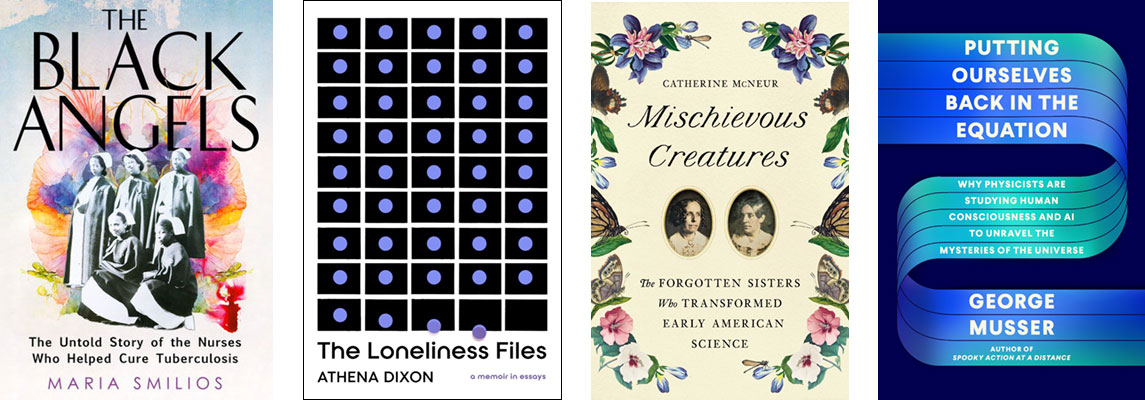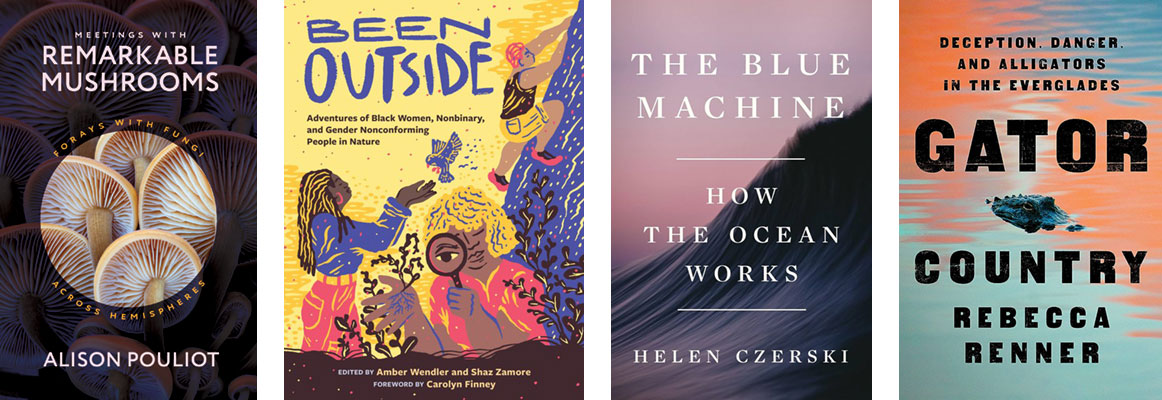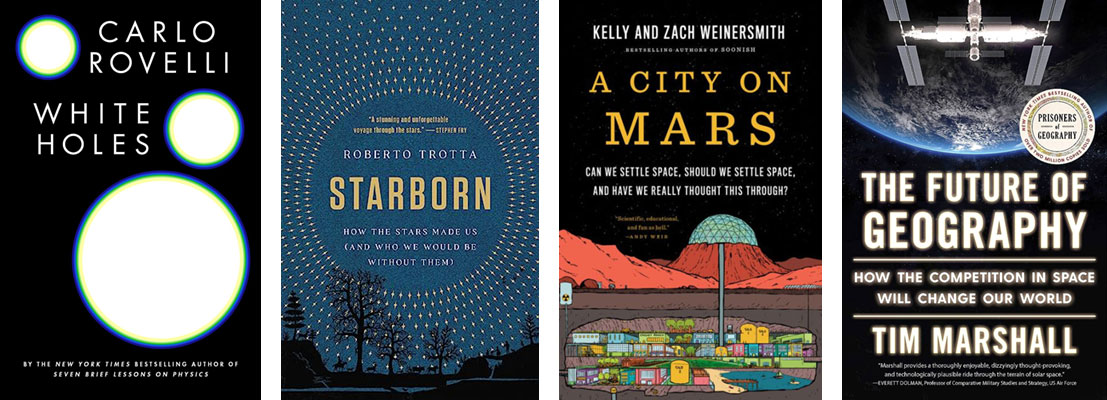Fall STEM Reads of 2023
By Jaime Herndon
Find new releases for your #ScienceSeptember book stack and beyond.
August 31, 2023
Science Culture Astronomy Biology Environment Physics Scientists Nightstand
It’s September, which means that once again, it’s time for Instagram’s #ScienceSeptember. This reading challenge was started by Lauren Weinhold (@end.notes), and focuses on scientific nonfiction during the month of September. By following the hashtag, you can find fellow readers who love science and see plenty of great science bookstacks with lots of great titles to add to your science to-read pile.
If you’re following along with #ScienceSeptember on social media, great! American Scientist will be posting some of our staff book piles for your inspiration on our Instagram (@american_scientist). But even if you’re not, there are so many great STEM-related reads coming out this fall that they can’t possibly fit into one month.
The Human Element

People, history, and the human condition are endlessly fascinating. These forthcoming books tell deeply human stories and unknown histories, as well as look at aspects of humanity and connection.
In 1929, before there were antibiotics and when tuberculosis (TB) was rampant, killing one in seven people, white nurses at Sea View, New York’s largest municipal hospital, were quitting in droves. The city recruited Black nurses from the South, not telling them how risky and dire the situation was, leading them to work in dangerous conditions. Although they helped to find the cure for TB, these nurses and their stories were largely ignored until now. The debut book by Maria Smilios, The Black Angels: The Untold Story of the Nurses who Helped Cure Tuberculosis (September 19), moves from the Great Depression past World War 2, following the nurses known as the “Black Angels,” finally telling their stories.
The Loneliness Files by Athena Dixon (October 3) is a reported memoir-in-essays that is a thought-provoking exploration of the concept of loneliness, and what that means in today’s digital age. How do we define connection—true connection? What are the gaps that cannot be filled by technology, and what does loneliness do to a person? Is there anything communal about loneliness? It’s a fascinating book that lays bare one person’s examination and experience of an aspect of being human, especially in today’s tech-filled world.
If you’re in the mood for another historical book, check out Mischievous Creatures: The Forgotten Sisters Who Transformed Early American Science by Catherine McNeur (October 31). In this book, McNeur writes about the work and lives of sisters Margaretta Hare Morris and Elizabeth Carrington Morris. Margaretta was an entomologist known for her work on 17-year cicadas, and Elizabeth was a botanist and an illustrator who also gave specimens to experts. Together, they helped the field of science grow and become more professional and specialized—but these efforts also further excluded or marginalized women in the field, ironically.
Putting Ourselves Back in the Equation: Why Physicists are Studying Human Consciousness and AI to Unravel the Mysteries of the Universe by George Musser (November 7) connects physics to neuroscience in an interesting way. When we observe something, the very act of observing changes things—so physicists need to first explain consciousness, which is where neuroscience comes in. Can the organization of the brain inform other areas of science, such as physics? He explores connections between quantum mechanics, cosmology, artificial intelligence, and much more, while also asking questions about the human mind.
The Great Outdoors

Exploring the natural world is always a good idea, no matter what season it is! If you’re more of an indoor explorer through books, there’s no shortage of wonderful reads this season.
Meetings with Remarkable Mushrooms: Forays With Fungi Across Hemispheres by Alison Pouliot (September 5) is an information-packed, entertaining read that also has gorgeous color photos of fungi. Ecologist Pouliot takes the reader on an adventure in both the Northern and Southern Hemispheres (so she can experience two autumns per year to study fungi), learning about these mysterious mycological wonders and the roles they play in our ecological systems.
We’ve all heard such catchphrases as “nature is for everyone,” but the truth is that it hasn’t always been that way, and it’s not always that easy. Even looking at the canon of nature writing and outdoors writing, there’s a long history of white male writers making up the bulk of these books. In Been Outside: Adventures of Black Women, Nonbinary, and Gender-Nonconforming People in Nature, edited by Amber Wendler and Shaz Zamore (October 1), we get essays and poems from leading Black women and nonbinary scientists about how outdoors and the life sciences shape them, as well as the moments that sparked a love for the natural world or science.
If the ocean is more your thing, don’t miss Helen Czerski’s The Blue Machine: How the Ocean Works (October 3). Czerski, a physicist and oceanographer, explores the physics behind the ocean. She looks at biology, history, culture, and much more, traveling all over the ocean: To the bottom of the sea, to coral reefs, to observing specific animals in their ocean habitats. She also writes about not only how the ocean works, but the dangers it faces and what we can do to protect its ecosystem.
Adventure, vivid nature writing, wildlife conservation, personal stories, and intrigue: You’ll find all of this in Gator Country: Deception, Danger, and Alligators in the Everglades by Rebecca Renner (November 14). Renner follows Officer Jeff Babuata and his journey to infiltrate the world of alligator poachers—but what happens when the lines between right and wrong begin to blur, especially in dangerous environments? What happens when it turns out that real life issues are not as clear cut as we’d like to think?
Spacing Out

If you’re more interested in the skies above than the ground we walk on, there are several new books that are perfect for your to-be-read list.
We’ve all heard of black holes, but how many of us are familiar with white holes? Physicist Carlo Rovelli will change all of that. His new book, White Holes, is a slim book but don’t let that fool you—its contents are vast, exploring black holes until getting to the white holes. But he’s also written a very personal book, sharing more about his work as a scientist, what it’s like to take risks and wonder about the universe, and the uncertainty of exploration.
If you’ve ever lost yourself in the night sky, check out Starborn: How the Stars Made Us (And Who We Would be Without Them) by cosmologist Roberto Trotta (November 7). He writes about how stargazing has been part of human civilization for centuries: how they’ve served as navigation tools, timekeepers, and inspiration—and the wonder they still hold today. What if the stars simply didn’t exist? Trotta contemplates the overall influence the stars have had on humans, history, and science.
There has been a lot of talk about what the future holds regarding colonizing other planets, and in this inventive, funny, and informative book A City on Mars: Can We Settle Space, Should We Settle Space, and Have We Really Thought This Through? by Kelly and Zach Weinersmith (November 7), we can see just how much more we need to think about things. The authors ask practical questions and also more complicated ones, such as how colonizing another planet can occur without causing problems on Earth. Filled with fun illustrations that bring the writing to life, this accessible and thought-provoking book explores what it will really take to build a society on another planet.
The Future of Geography: How the Competition in Space Will Change Our World by Tim Marshall (November 7) looks at the space race in a whole new way. Marshall writes about the geopolitics of space and the increasing tensions between the United States, China, and Russia, and what these dynamics could mean for the future of space exploration and global politics and power. It’s a fascinating exploration of how all these issues are intertwined, delving into their shared history and how we got to where we are today.
What are you reading first?
American Scientist Comments and Discussion
To discuss our articles or comment on them, please share them and tag American Scientist on social media platforms. Here are links to our profiles on Twitter, Facebook, and LinkedIn.
If we re-share your post, we will moderate comments/discussion following our comments policy.